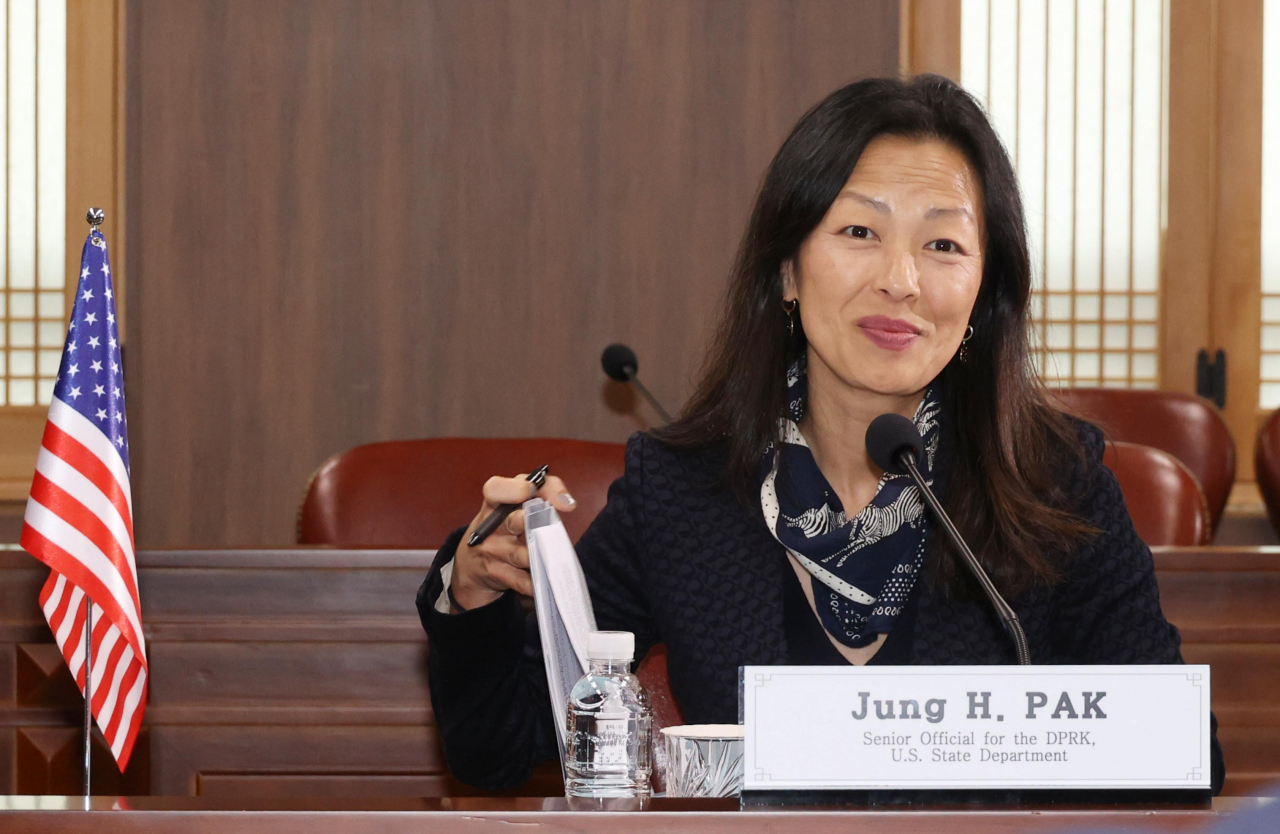 |
This photo shows US Senior Official for North Korea Jung Pak attending the bilateral meeting at the Foreign Ministry in Seoul on Jan. 18, 2024. (Newsis) |
The top US nuclear envoy pointed out the need Tuesday for "interim steps" to be taken on a path towards North Korea's ultimate denuclearization, which she stressed would not happen "overnight."
US Senior Official for North Korea Jung Pak made the remarks while reiterating Washington's "clear" goal to pursue the denuclearization of the Korean Peninsula.
On Monday, Mira Rapp-Hooper, the US National Security Council senior director for East Asia and Oceania, also said that Washington will consider "interim steps" -- a statement that raised speculation about a potential US policy shift.
"I don't want to prejudge that as a final step," she said at a forum hosted by the Carnegie Endowment for International Peace. "But I think it goes without saying that there would have to be interim steps toward ultimate denuclearization."
Pak was responding to a question of whether interim steps would involve the North's nuclear weapons freeze in return for sanctions relief and how the United States would prevent interim measures from ending up being a final step.
US officials' mention of such steps raised speculation that Washington could exert more flexibility to deliver on its repeated commitment to engaging in "serious and sustained" diplomacy with Pyongyang that has so far rejected talks on its denuclearization.
Pak called attention to the fact that there are "a lot of weapons to be dealt with" in an apparent indication that those weapons should also be addressed alongside or before potential future negotiations over the North's nuclear programs.
"I think it is really important to acknowledge that there is a lot of weapons to be dealt with," she said, noting the North's efforts to develop solid-fuel ballistic missiles, tactical nuclear weapons, hypersonic capabilities and unmanned underwater vehicles.
"Given the scope of the DPRK weapons activities and its proliferation, there is a lot to work with there ... It is not going to happen overnight. That's the reality of it," she added. DPRK stands for the North's official name, the Democratic People's Republic of Korea.
Touching on Pyongyang's foreign policy changes, including its growing alignment with Russia, Pak said that the US assesses North Korean leader Kim Jong-un is taking a "long-term strategic shift" to achieve his "primary" goal: the preservation of the dynastic Kim regime.
"One question many knowledgeable DPRK watchers have asked is whether Kim is truly undertaking a long-term strategic shift or whether these changes are a tactic intended to create or exploit divisions among the DPRK's adversaries," she said. "We believe it's the former."
Pak said that Kim seems to have decided he cannot achieve his primary goal through negotiations with the US and South Korea.
"(Kim) is viewing the world through a new Cold War lens in which the DPRK can benefit from aligning more closely with Russia and the PRC," she noted. PRC stands for China's official name, the People's Republic of China.
The envoy also highlighted the need for China to play a "constructive" role over North Korea issues.
"We encourage the PRC to play a constructive role whether it's full implementation of sanctions as well as to continue to prod the DPRK to come to negotiation dialogue and refrain from these activities that are harmful to regional security," she said.
Pak used the forum to alert the public about the perils of North Korea's cyber activities and their IT workers overseas.
"In 2024, we have a DPRK that has a very sophisticated cyber program. The use of malicious cyber activity for espionage or to simply steal money," she said. "Then, there is also the issue of DPRK IT workers whom they have deployed and who work to generate revenue for the regime."
She warned that North Korean IT workers use various legitimate websites to get jobs and work through back doors to steal technologies and other intellectual property.
Pak, moreover, shared a recent incident where she could have fallen victim to an apparent cyber incursion before she called for public cybersecurity caution.
"Always be on the lookout. No one is immune," she said. "The DPRK does not discriminate on who the targets are. It doesn't matter if you are a friend or a foe." (Yonhap)







![[Today’s K-pop] Blackpink’s Jennie, Lisa invited to Coachella as solo acts](http://res.heraldm.com/phpwas/restmb_idxmake.php?idx=644&simg=/content/image/2024/11/21/20241121050099_0.jpg)